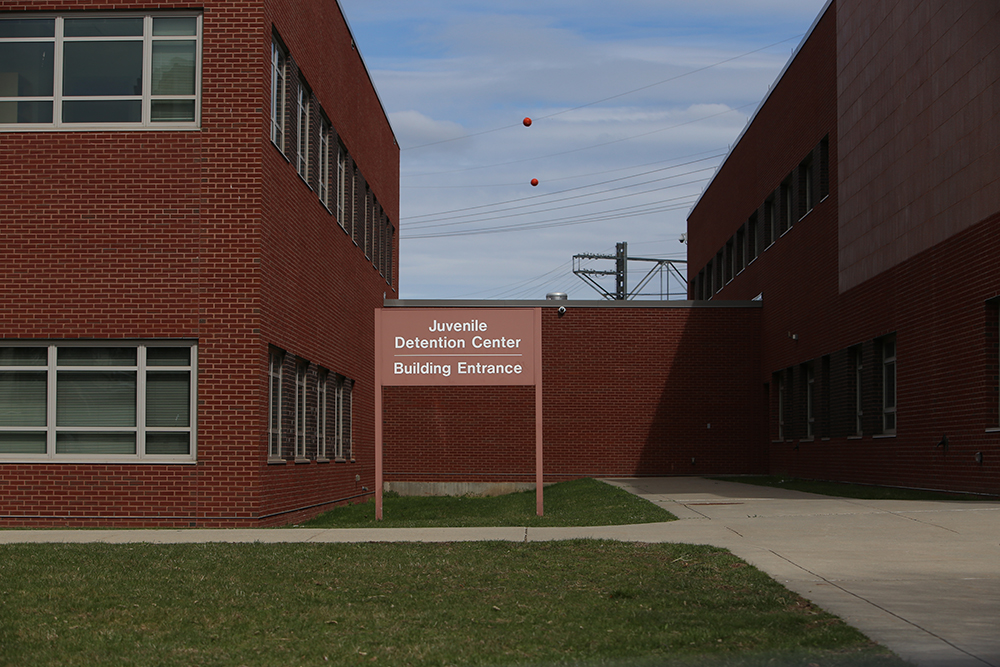A coalition of juvenile justice advocates in Connecticut are calling on state leadership to take action to protect juveniles currently held in detention from the COVID-19 pandemic before it is too late. They urge the release of youth held in both the adult and juvenile systems and want more preventative measures to be put in place to prevent the spread of the virus within facilities in the meantime.

Connecticut Juvenile Justice Alliance
Abby Anderson
“They must treat kids like kids and give them the resources, care and attention they deserve,” said Abby Anderson, the executive director of the Connecticut Juvenile Justice Alliance (CTJJA), during an online press conference on Wednesday. The alliance is a statewide public policy and advocacy organization that is leading the effort to end the criminalization of youth in Connecticut. “We have to do it now.”
The advocates first contacted Gov. Ned Lamont, Chief Court Administrator Patrick L. Carroll III, and Department of Correction Commissioner Rollin Cook on March 19 in a letter signed by Anderson and the leaders of 10 other organizations, including the state’s child advocate, Sarah Eagan.
 The advocates are also asking the legislature to provide funding to make release possible and to fund the agencies and organizations that will have the job of monitoring the youths and making sure they are healthy and safe after their release.
The advocates are also asking the legislature to provide funding to make release possible and to fund the agencies and organizations that will have the job of monitoring the youths and making sure they are healthy and safe after their release.
A spokesperson for Judicial Branch External Affairs said they were too busy to respond to questions about their response to the coronavirus pandemic at the moment.
“The people you want answers from are extremely busy trying to protect the youths in custody and employees amid this pandemic,” Rhonda Stearley-Hebert wrote in an email. “They simply have not have not the time to fully respond to your multiple questions. We will get the information as soon as possible.”
The Department of Correction (DOC) was also too busy to comment. An employee from another department answered a call to Public and Media Relations, saying they’ve been overloaded with calls from reporters and family members of inmates trying to get information. The DOC did respond to an email, saying they were experiencing an uptick in requests and listed a webpage with information on staff and inmates who had tested positive for COVID-19.
The governor’s office also could not be reached for comment.
National movement to release juveniles
The push for the release of juveniles in detention in Connecticut is just one of many nationwide, with advocates in other states making the same demands.
“This will be, when it hits these facilities, an absolute nightmare to deal with,” said Vincent Schiraldi, the co-director of the Columbia University Justice Lab in New York City about the coronavirus pandemic in a Tuesday press conference that addressed juveniles in detention nationally. The former director of the Washington, D.C. Department of Youth Rehabilitation Services and the former commissioner of the New York City Department of Probation, Schiraldi said the very design of juvenile detention centers is counterproductive to stopping the spread of the virus.
“These places are built to do the exact opposite of physical and social distancing,” he said. “Kids will not be safer in these places.”
As of Wednesday morning, there were at least three positive cases of COVID-19 in the Hartford Juvenile Detention Center which has suspended intake of new youth for now. York Correctional Institution, where the DOC houses young women who have been charged as adults, have two inmates and one staff member who have tested positive for the virus. It is unclear whether or not the girls in their custody have been affected. So far, the Bridgeport Juvenile Detention Center and the DOC’s Manson Youth Institution, where young men who have been charged as adults are held, have no reported positive cases of COVID-19.
According to reporting by News 12 Connecticut, Connecticut ranks fourth in the number of COVID-19 cases per capita, coming in behind New York, New Jersey and Louisiana.
There were 102 youth held in detention across Connecticut as of Wednesday morning, according to numbers from the CTJJA. Fifty-seven were in the youth system and housed in the detention centers in Bridgeport and Hartford. The other 45 were ages 15 to 17 who have been charged as adults and are in the custody of the DOC. As of Wednesday morning, there were 43 boys at the Manson Youth Institution and two girls at the York Correctional Institution.

University of New Haven
Michael Lawlor
Who has the ultimate say as to who gets released depends on the status of the individual cases and which system they are in, said Mike Lawlor, former state undersecretary for criminal justice policy and planning. Most of the youth are in pretrial detention, most likely because their family could not afford bail, he said.
The release of those in pretrial detention, whether in the juvenile or adult systems, is at the discretion of the judge who authorized their confinement. Administrators and juvenile probation officers have authority over the youth in the juvenile system, he said. And for those who have been charged as adults, who decides their release depends on how long their sentence is. If their sentence is for less than two years, it is at the DOC’s discretion. If it is longer, the parole board decides, Lawlor said.
“There’s a lot of moving parts here,” he said. “Somebody has the ability to do it.”
‘A potential disaster’

Connecticut Senate Democrats
Sen. Gary Winfield
State Sen. Gary Winfield, a Democrat, said those with the authority to authorize releases won’t do so without directions from the governor and other higher ups.
“There needs to be clarity from the very top,” he said during the Wednesday press conference. He has been pushing for the release of inmates system-wide, not just juveniles, and sent his own letter asking for more information from the DOC on how they are planning to combat the coronavirus pandemic and whether or not they have release plans in place.
“If we leave things as they are, we are setting ourselves up for a potential disaster,” Winfield said.
The Connecticut advocates want a statewide, cross-agency effort to create “individualized plans” for each detained youth so they can be safely released into the community. And, while they are detained, they want assurances that the youths will not be unnecessarily and overly isolated in solitary confinement, that they will have access to education, mental and medical health care, and proper hygiene and sanitation to prevent contracting and spreading the virus.
Releasing as many as possible will also protect the corrections officers and other staff who work in the facilities because they, too, will catch the virus if nothing is done, the advocates said.
“We have experts -— thoughtful people — people whose jobs it is to run agencies around these issues,” Anderson said. “We have to tell them and give them the leadership that that’s what we want them to do right now.”
Each child’s situation is different, she said, and each will have different needs to be considered for a successful release, such as whether or not they have a stable home to return to, a reliable way to check in remotely with whomever is monitoring them after their release and whether or not they are a threat to public safety. There is no one-size-fits-all, she said.
“If we believe that there is a young person who is an immediate and serious threat to public safety, what does” protecting such detained youths from the pandemic look like, Anderson asked.
Concerns about solitary

ACLU of Connecticut
David McGuire
David McGuire, the executive director of the American Civil Liberties Union of Connecticut, said there had already been concerns about incarcerated young people before the pandemic. Those concerns are only exacerbated now.
"They are locked in a facility at the mercy of the system,” he said. The governor has focused on helping small businesses and providing support for citizens struggling due to the pandemic, he said, but invisible groups like youth in detention can’t be forgotten.
“These populations need the help more than many others,” McGuire said. “They can't fend for themselves or advocate for themselves."
One of his concerns is the use of solitary confinement. Despite 2017 legislation banning its use with juveniles, there were reports of it still being used on youth in the DOC’s custody. With the spread of COVID-19 and people not in prison being encouraged to social distance, McGuire worries that its use will only increase.
“In a situation where there's a public health emergency, where there's decreased staff and a natural inclination on the part of administrators to lock things down even more, that is a prime concern of ours,” McGuire said. “Kids are going to spend days, if not weeks, in isolation, which is damaging in the long term."
Measures to prevent the spread of COVID-19 are already in place in both the juvenile and adult facilities, many of which are socially isolating. Volunteer groups and family and friend visitation have been suspended. School has been cancelled in both systems.
In the juvenile detention centers, the youths have been given educational packets to work on, but advocates say that’s not going to be enough long term. And to help them stay in touch with their families, youth in the juvenile detention centers have unlimited free phone calls while youth in the adult system get two free calls a week.
Pre-existing conditions, mental health
Advocates like Marisa Halm worry about how sustainable this is and what the effects of such isolation will be on the youth in the short and long term.
“Access to mental health staff is at the forefront,” said Halm, the director of the TeamChild Juvenile Justice project at the Center for Children’s Advocacy. The DOC has reassured them that mental health staff will make sure to check in more often with the youth in their custody, she said, but they still worry about the stress caused by the isolation and by the pandemic itself.
Plans for access to medical health care is also a priority, Halm said. Many of the youth who tend to be in the justice system have pre-existing conditions such as asthma and are higher risk. Access to medical care is already difficult enough without a pandemic, she said. With no control over their access to sanitation and hygiene products, and with the nature of life inside a prison, Halm said they want to know what the plan is for when the youth inevitably catch the virus.
“What are we doing for those youths who already have compromised immune systems or have other conditions that would make them more susceptible?” Halm asked.
Representatives from CTJJA said they have not heard directly from youth inside or their families since the pandemic started. Normally their justices advisors, a committee made up of young people ages 18 to 25 with either first- or second-hand experience with the criminal justice system, go to the institutions and conduct what is called a vision session.
These sessions are open forums where the justice advisors talk to the youth about their personal experiences and also hear from them about their concerns about their life in detention and out in the world. The advisors then bring these concerns to the movers and shakers in the state to push for policy changes. CTA has conducted vision sessions with more than 150 people in the past two years.
While they haven’t been able to get into the facilities since the pandemic, many of the concerns the youths had in previous sessions are relevant and more urgent during the pandemic, said Jordyn Wilson, one of CTA's justice advisors. Wilson is a senior at Western Connecticut State University where she studies justice and law administration with a concentration in corrections, probation and parole.
“We know what their needs are,” she said. “There’s no reason that we shouldn’t be meeting them, especially in a national pandemic.”
Wilson said she’s participated in two vision sessions since she became a justice advisor in August 2019. What she and the other advocates are asking for — fewer young people behind bars, more emphasis on community and restorative justice, and providing more and better resources to those who are incarcerated — is nothing new.
But now, with the damaging effects of the coronavirus pandemic sweeping the state and the nation, their demands are more urgent than ever.
“I feel helpless now,” she said about the stress of living through this unprecedented public health crisis. “And I’m not behind bars.”
This story has been updated.
